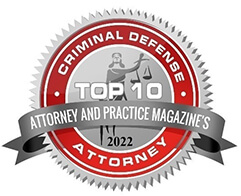Staten Island Aiding and Abetting Defense Lawyer

Staten Island Aiding and Abetting Defense Attorney
Aiding and abetting a crime in Staten Island, NY falls under the same legal definition as committing a crime, meaning they are both punishable to the same degree. If you’ve been charged with aiding and abetting, you could be facing serious charges and severe penalties. It is vital that you work with a skilled and qualified Staten Island aiding and abetting defense lawyer to assist you in your case.
A criminal defense lawyer will not only have the experience required to handle the offense for which you are accused of aiding but also the legal knowledge to defend the charges of assisting or abetting the crime.
Staten Island Aiding and Abetting Criminal Defense Lawyer
Holding a high reputation throughout the New York City area, Michael Vitaliano and the rest of his team at The Vitaliano Law Firm defend clients accused of a wide range of criminal offenses, including felonies and misdemeanors related to white-collar crimes, personal injury crimes, and drug charges. By combining unwavering legal persistence and unflinchingly aggressive defense, Michael Vitaliano has successfully secured favorable outcomes in his clients’ cases.
What Is Aiding and Abetting?
When a crime has been committed, federal law is ready to prosecute anyone involved in making the crime happen, no matter the degree of involvement. In fact, the law makes no distinction between someone who commits a crime and someone who merely provides the means or offers information that knowingly allows the crime to occur.
Far from being a separate offense of its own, those convicted of aiding and abetting a crime are treated as if they had committed the crime themselves. This includes:
- Offering aid in committing a crime
- Abetting or encouraging someone to commit a crime
- Offering counsel to someone attempting to commit a crime
- Commanding someone to commit a crime
- Inducing a crime
- Commissioning a crime
There is, however, a legal distinction between aiding and abetting a crime and being an accessory to a crime. Being an accessory to a crime is a separate criminal offense and is charged to individuals who commit an act after the alleged crime. To be guilty of aiding and abetting, you must have committed an act before the alleged crime took place.
Prosecuting for a Crime by Aiding and Abetting
In order to reach a guilty verdict, the prosecution must demonstrate that all the following are true in the case:
- Someone else committed a crime
- The defendant aided, encouraged, commanded, counseled, or otherwise helped bring about the alleged crime
- The defendant acted with the intention of helping to facilitate the crime
- The act occurred before the crime was completed
An individual is guilty of aiding and abetting when they actively participate in a criminal act or venture after having prior knowledge that a crime was being committed. Their knowledge of the crime must be at a time that allows for a realistic opportunity to withdraw from the crime. It should be noted that it is not necessary to name a defendant who allegedly committed the crime in question in order to prosecute a separate defendant for aiding and abetting said crime.
Defending Against Aiding and Abetting Charges
The burden of proof lies on the prosecution to establish beyond reasonable doubt that all the necessary elements were present in order to sustain a guilty verdict. This means, for example, that it would not be enough to merely establish that the defendant:
- Knew or was associated with the one accused of committing the crime
- Unknowingly or unintentionally acted in helpful ways to the person committing the crime
- Was present at the scene of the crime
Your aiding and abetting defense attorney will work with you and the details of your case to create an effective defense strategy that challenges the assumptions of the case and presents doubt as to your involvement in the original crime.
FAQs
Q: What Are Examples of Aiding and Abetting?
A: Aiding and abetting a crime includes any kind of encouragement in committing the crime or engaging in some degree of support in carrying out the crime itself.
This could include knowingly providing information or equipment that will be used in the commission of a crime, acting as a lookout or watchman while the crime is being committed, or acting as a getaway driver. Providing protection or shelter for someone who committed a crime would fall under a different offense.
Q: What Is the Crime of Aiding and Abetting?
A: If you had a part in ensuring that a crime was carried out, whether or not you were guilty of the criminal deed itself, you could be held legally liable. Aiding and abetting involves four components. First, a crime was committed. Second, the individual helped or encouraged the crime to be committed. Third, there was intent to facilitate the crime. Lastly, the individual must have acted prior to the crime being committed.
Q: Is Aiding and Abetting Illegal?
A: Aiding and/or abetting any crime is illegal and constitutes a criminal offense. Federal law treats aiding and abetting a crime with the same level of legal responsibility and consequence as committing a violation first-hand. In fact, the letter of the law removes any distinction between the two. While most people believe that aiding and abetting represents a separate, unique criminal offense, it does not. Helping to commit a crime is legally the same as committing the crime yourself.
Q: What Is the Federal Law on Aiding and Abetting?
A: Federal law on aiding and abetting arises from Title 18, United States Code § 2, which states that anyone who commits a crime or aids or abets it in any capacity can be punished.
Additionally, federal law does not require the government to prove who committed the violation and who provided the aid. Ultimately, this means that any participation in a crime, no matter the degree, is punishable to the fullest extent.
Your Staten Island Representation for Aiding and Abetting
There is no legal distinction between committing a crime and merely aiding or abetting one. If you’ve been accused of participating in carrying out a crime, no matter to what degree, it is important that you seek immediate legal counsel. The Vitaliano Law Firm offers a free consultation to discuss the details of your case and provide you with initial counsel on how to approach your defense. Let us help you today by contacting our office.
Testimonials






